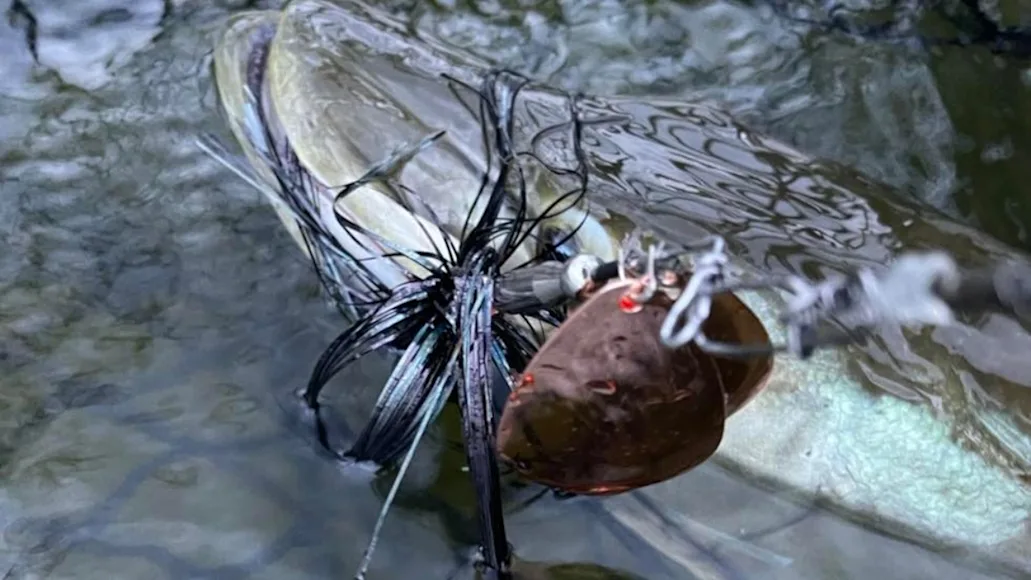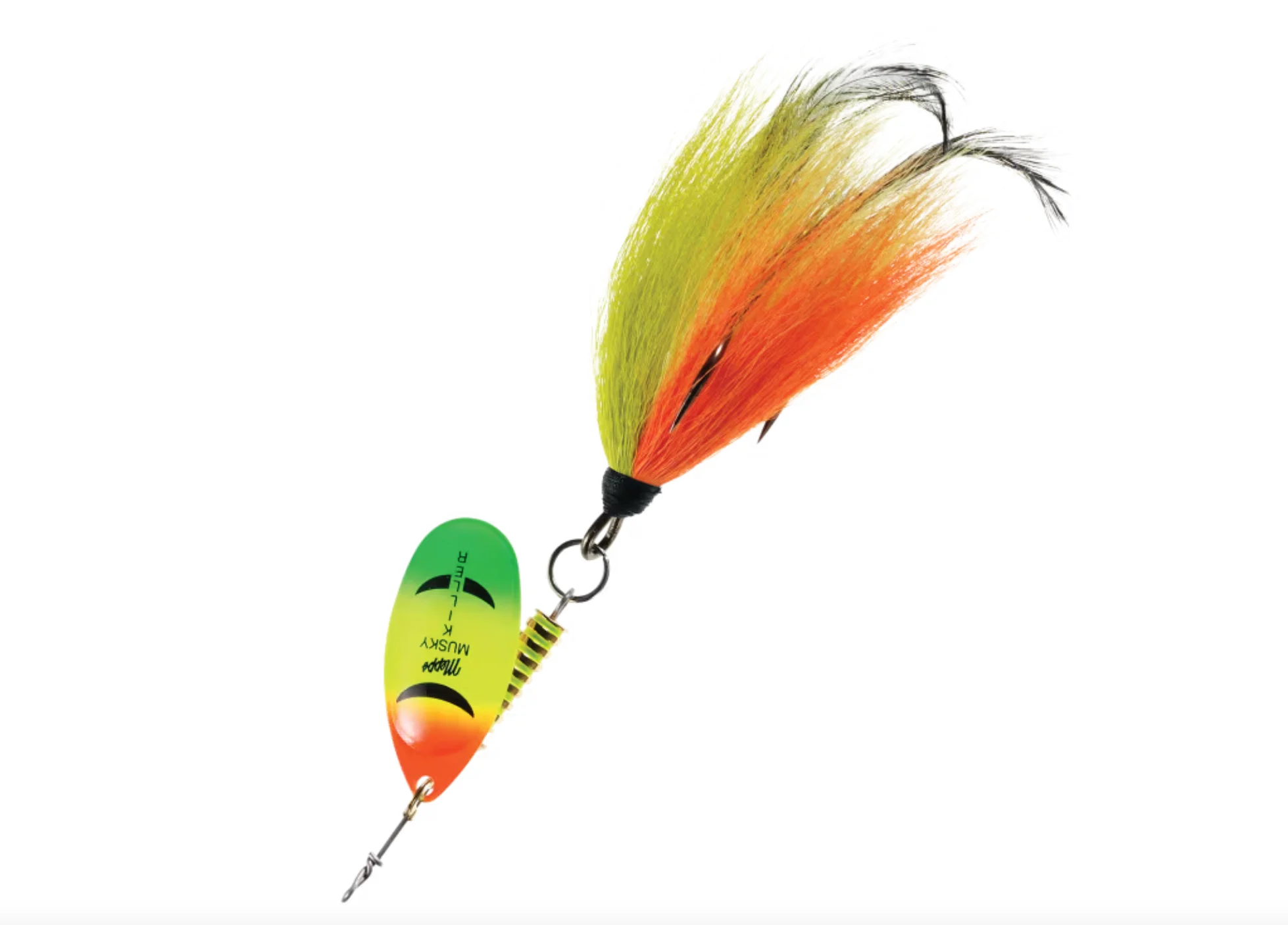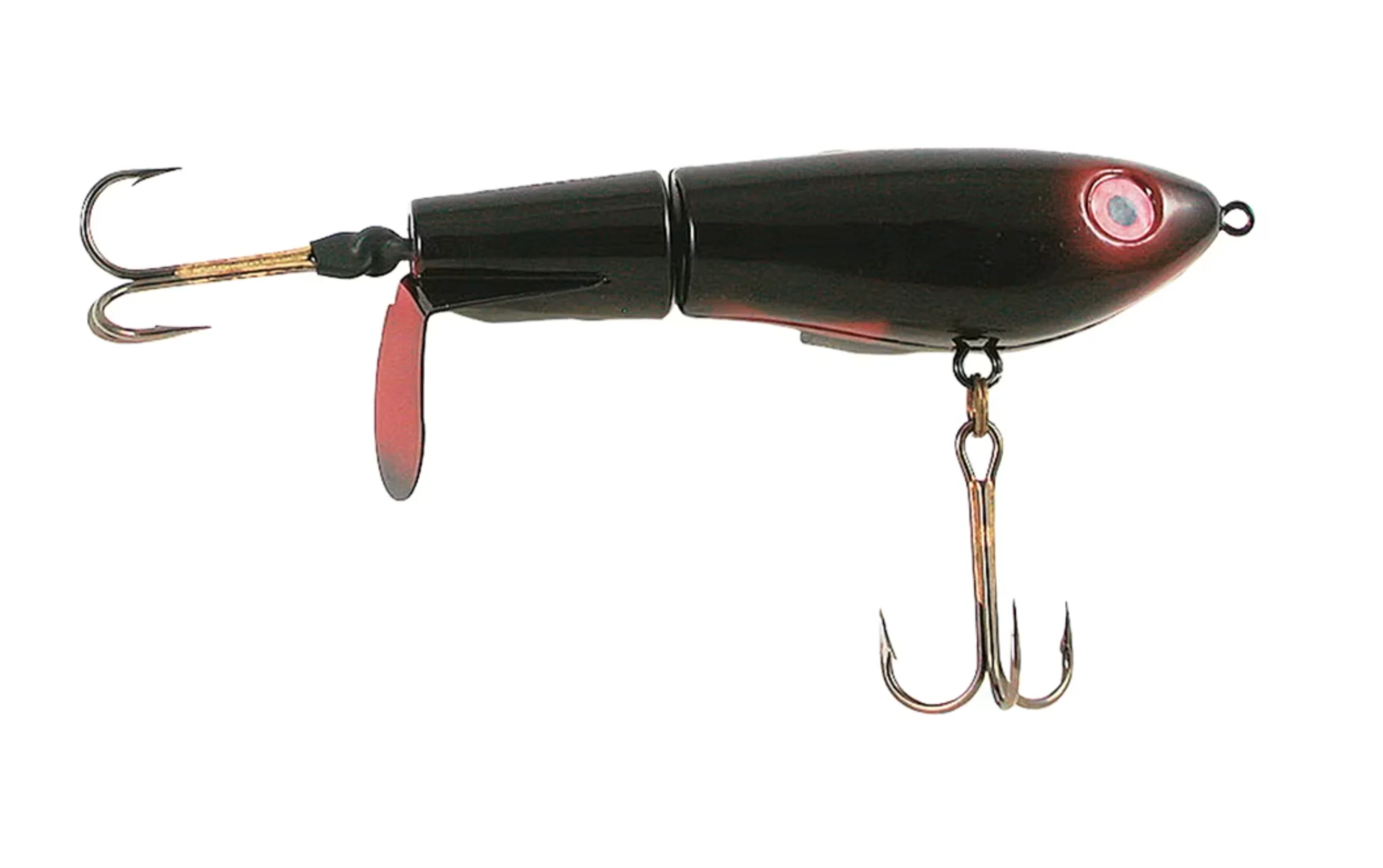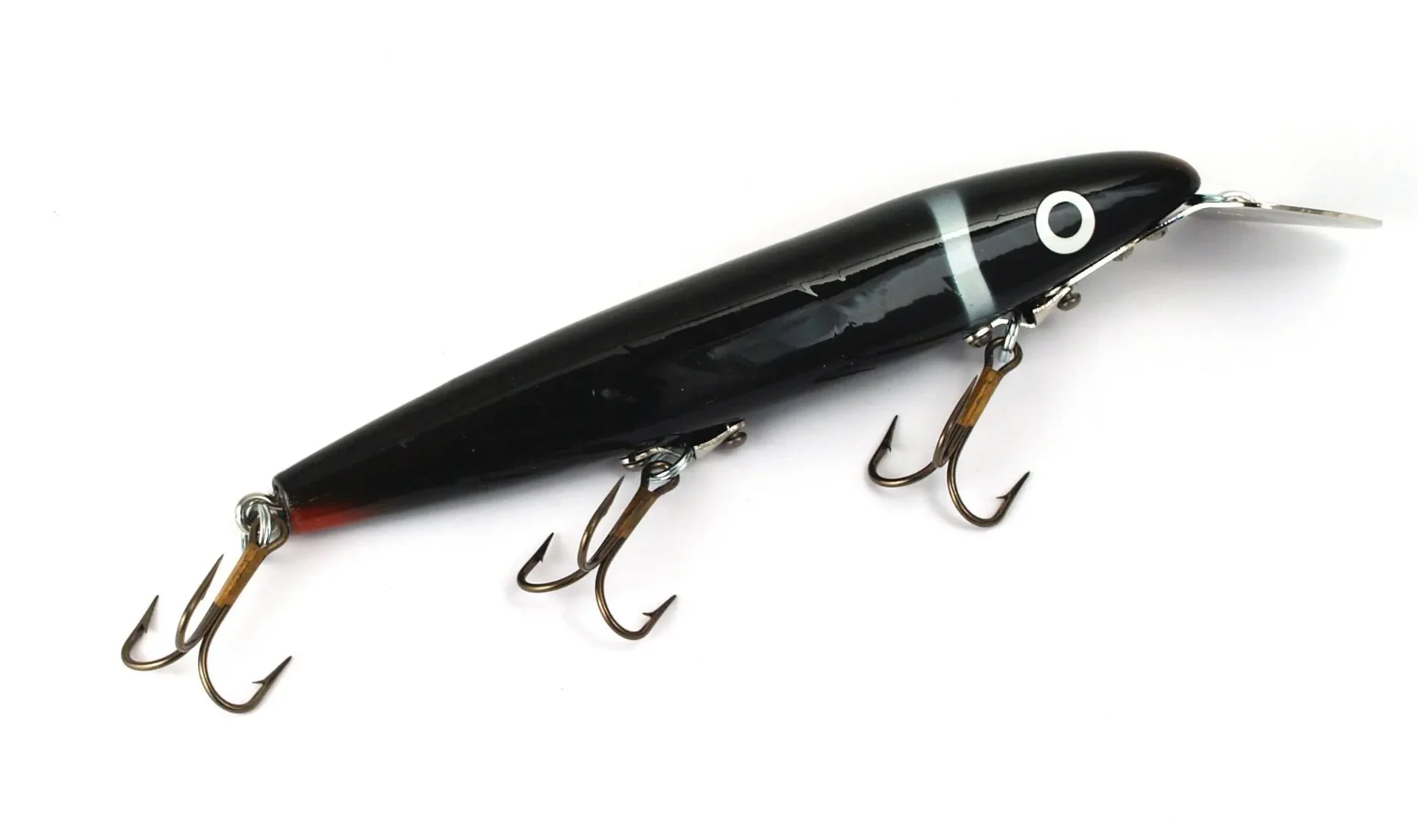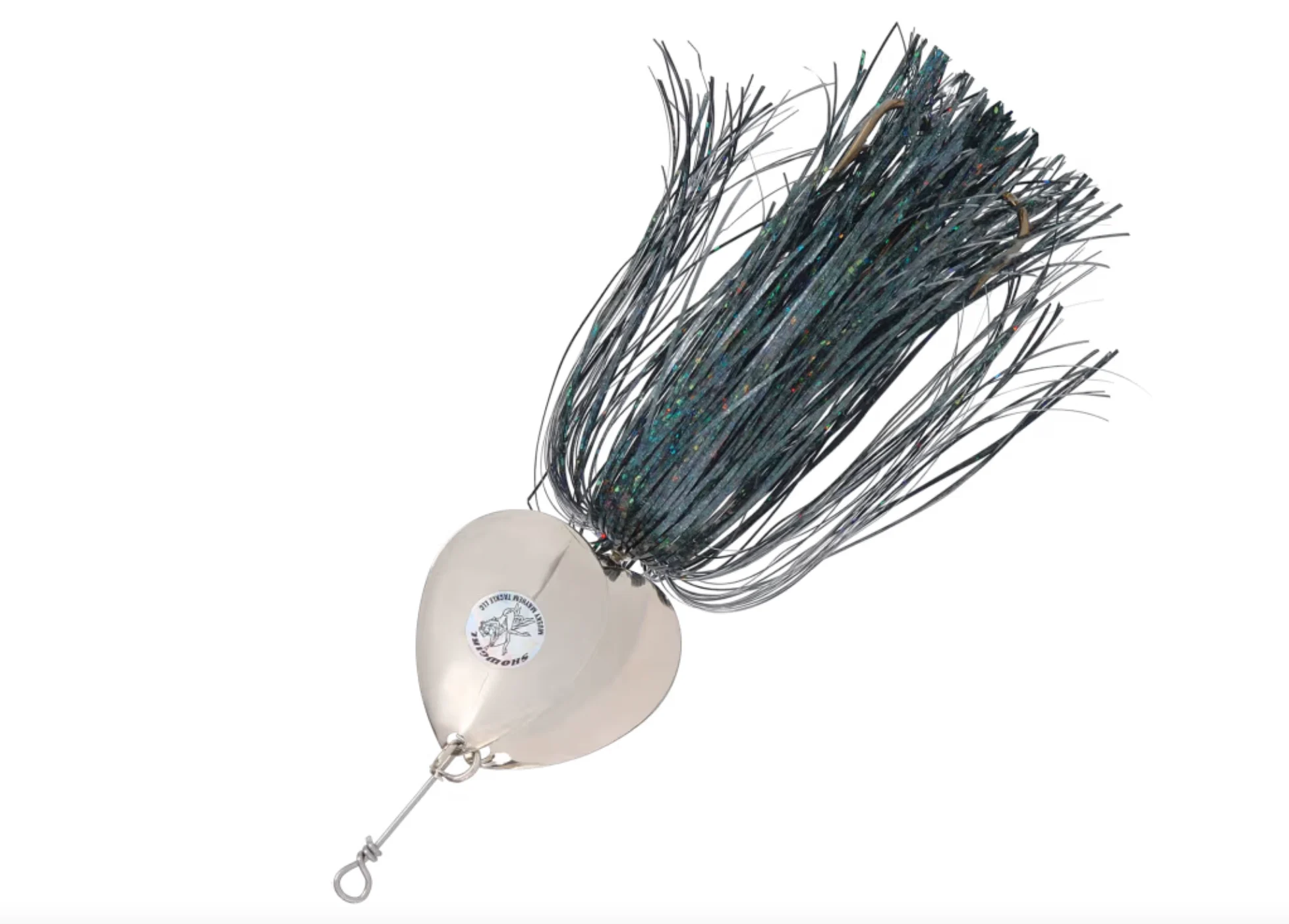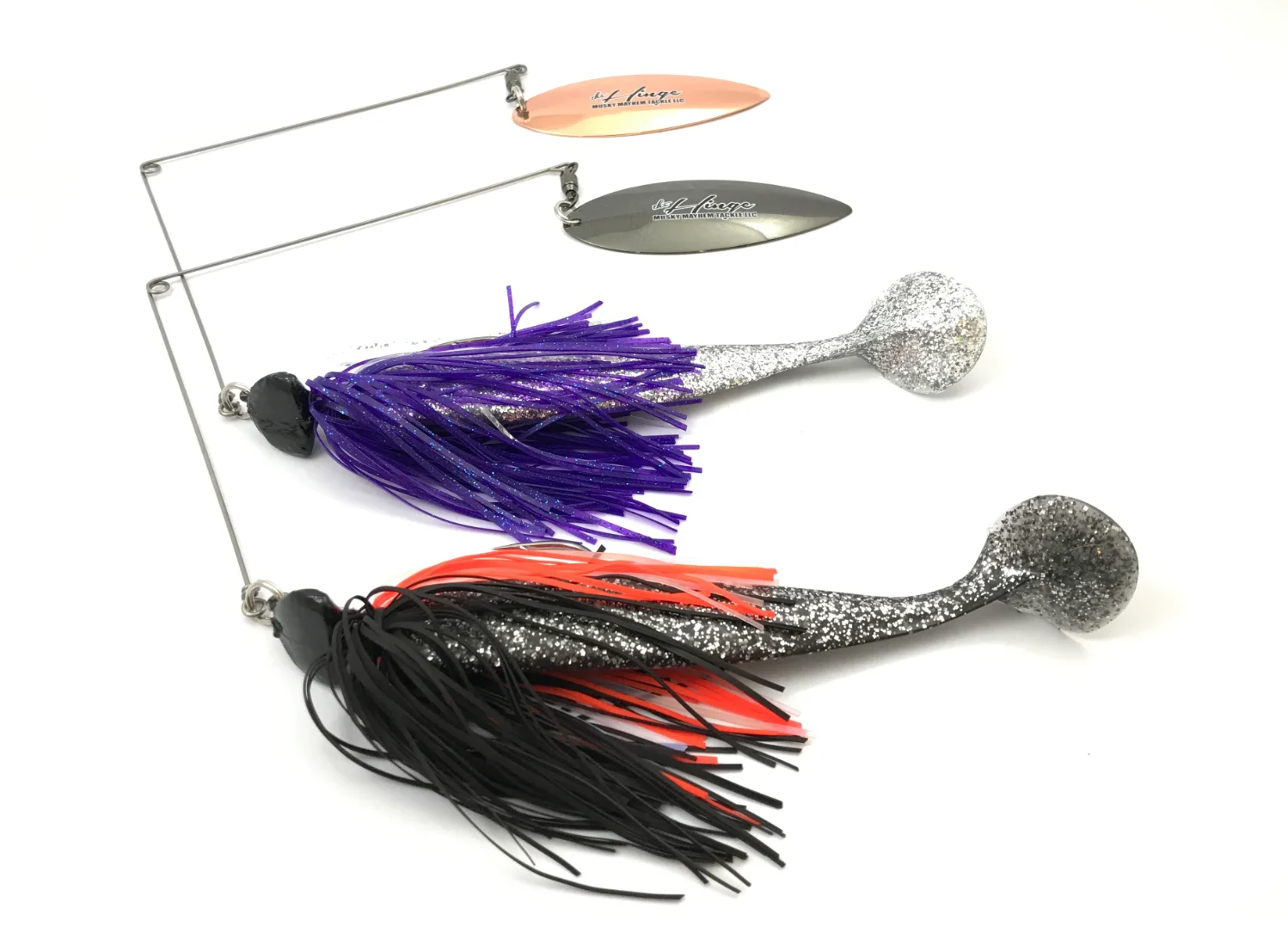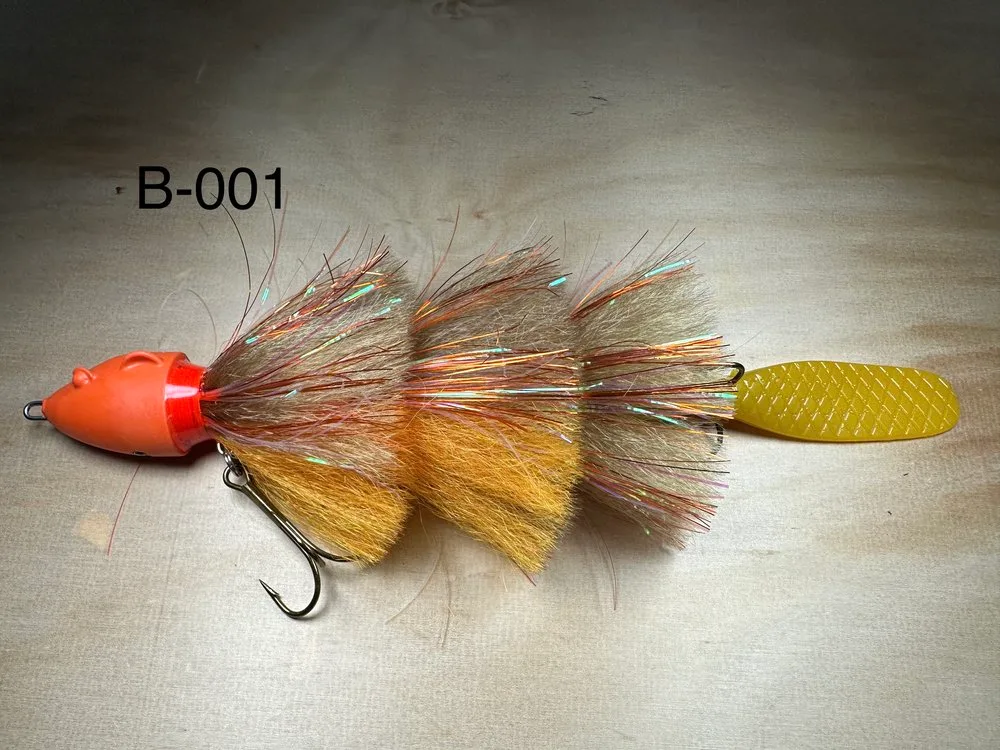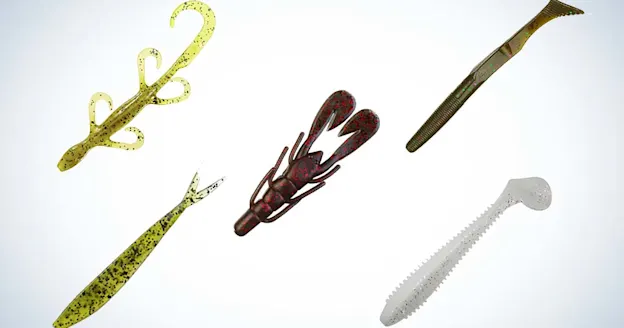We may earn revenue from the products available on this page and participate in affiliate programs. Learn more ›
This lure’s metal lip not only holds up to whacking hard bottom, but can be tweaked so the bait’s action matches the musky’s mood.
Musky lures are so important because, well, muskies are moody. Without a doubt, it’s this fish’s temperamental disposition that makes them so frustrating to fish for, even for the most passionate musky hunter. You know they’re there, lurking; most likely watching your swim past without even showing a twitch of interest. Fortunately, the best musky lures can help tip the odds in your favor.
Best Overall: Mepps Musky Killer
Best Crankbait: Crane 208 Crankbait
Best for Trolling: Suick Husky 1800 Series Cisco Kid
Best for Topwater: Joe Bucher TopRaider
Best for Spring: Musky Mayhem Double Showgirl
Best for Summer: Musky Mayhem The Hinge
Best for Fall: Beavers Baits Baby Beaver
Best for Winter: Bondy Bait Original
How We Picked the Best Musky Lures
I’ve been a fishing addict for as long as I can remember, and I perused the tackle department at local department stores as often as I did the toy aisle in my youth. It wasn’t until hooking into a few Esox later in my teens, however, that I started paying as close of attention to the musky baits as others hanging from the pegs. And to tell you the truth, the array of musky baits to choose from back then wasn’t even close to what’s available today.
The best musky lures were chosen because they’ve proven themselves time and time again as being high-quality baits that have caught fish; not just by me, but the folks who spend hours on the water chasing these elusive fish day after day. After all, when a musky finally decides it’s going to show its weary head, you want to be using a lure that will entice a strike, and then keep that fish hooked until the encounter is over.
The Best Musky Lures: Reviews & Recommendations
Best Overall: Mepps Musky Killer
Specs
Length: 6.5 inches
Weights: 3/4- and 1-1/3-ounce
Plain or dressed treble hook
26 blade colors, 29 tail colors
Pros
Real fur and feather dressed hook
Easy-to-replace hook
Simple, uncomplicated design
Cons
No trailer hook
One of the oldest manufactured musky lures on the market, the Mepps Musky Killer has, more than likely, fooled more fish of its namesake than any other. It fishes well year-round in natural lakes, reservoirs, and rivers, in clear or stained water as well as shallow water or deep.
Fish will strike a spinner with just a standard, steady retrieve. But lessons learned from Bass Pro Kevin Van Dam, no matter what species he’s targeting, is to give any lure a few added twitches during the retrieve. This especially holds true with any lures that spin, such as the Musky Killer. The change in the blade’s cadence alters its vibration, as well the stop-and-go and darting emulates of forage being chased down by a predator; the latter influenced to strike before the bait gets away.
Best Crankbait: Crane 208 Crankbait
Specs
Length: 8 inches
Weight: 2 ounces
12 hand-painted colors
Pros
Buoyant, balsawood body
Wobbles properly right out of the package
Made in the USA (West Virginia)
Cons
Paint may chip after musky-tooth damage
A Crane excels when fishing over structure, such as rock piles, rocky points, wood slabs and along the outer edge of weed beds, as you can cover a lot of water quickly with it. It’s light enough to be cast all day without much arm fatigue, yet is also a good choice for trolling. The density of this lure, made of wood, gives it a tight, darting action over a wide wobble, which works wonders as the water warms. And if your lure’s headed for an inevitable snag, a Crane will rise in the water column quickly while slowing or stopping your retrieve.
Want more crankbaits to choose from? We compiled a list of the best crankbaits for a variety of situations.
Best for Trolling: Suick Husky 1800 Series Cisco Kid
Specs
Length: 9.5 inches
Weight: 3 5/8 ounce
Heavy-duty plastic construction with metal lip and components
24 colors
Pros
Perfect for trolling
Can take a beating
Lots of darting action on its own accord
Cons
Water can enter body if punctured
The 1800 Super Husky Cisco Kid’s metal lip not only holds up to whacking hard bottom, but can be torqued with a pair of pliers if the original action is altered from hitting said structure. You can also tweak the bait’s action to match the musky’s mood. It runs from 10 to 15 feet down when trolled, depending on length of line out and diameter used. This lure’s wide wobble makes it work wonders when trolled within a motor’s prop wash, mere feet from the prop itself. This is an overlooked technique yet takes a lot of fish. And that metal lip gives off a mirror-like flash while shuttering through the turbulence.
Best for Topwater: Butcher TopRaider
Specs
Length: 8 inches
Weight: 2.5 ounces
Single, rotating tail section
18 colors
Pros
Snag resistant
Easy to use
Stays in tune
Cons
Specific rods needed for best hookset
Nothing’s better than a strike on a topwater bait. Now imagine that attack by a fish measured in feet rather than inches. The Bucher TopRaider has been triggering strikes with its rotating rear fin churning up the surface like a critter franticly swimming across a lake for over two decades now. It’ll get you in on the action, too.
This topwater bait, similar to today’s ever-popular Whopper Plopper, shines when muskies are actively feeding in shallow water, whether clear or stained. It rides over the top of thick mats of weeds when the bottom hook is removed, letting you target these ambush predators in the thick stuff that they prefer. Just be aware that the TopRaider is best used on a medium-heavy-powered rod longer than six feet.
Best for Spring: Musky Mayhem Double Showgirl
Specs
Length: 7.5 inches
Weight: 1.6 ounces
Two #7 Colorado blades
34 colors
Pros
Good for other times of year as well
Lots of flash
Works in clear or stained water
Cons
Can twist line without ball-bearing swivel ahead of it
The Double Showgirl in-line spinner can be used on an array of different action rods. As its name implies, this lure has two blades, spinning on opposite sides of one another. The resistance of the double wide-profile blades spinning allows the lure to be retrieved slowly and still have plenty of flash and vibration. It can also be ripped back high in the water column once the water starts to warm up, triggering an aggressive attack.
Best for Summer: Musky Mayhem The Hinge
Specs
Length: 12 inches
Weight: 4.5 ounces
Size-8 willow blade
28 colors
Pros
Unique action triggers strikes from even hesitant muskies
Less chance of losing fish during battle
Good in deep water or shallow water
Cons
Paddle tail may need replacing after a catch
The Hinge is named for its unique design. Instead of a molded weight system, it has a hinged jighead that gives the innovative bait a unique action. Coupled with vibration from the blade, this provides a rolling swim to the trailing paddle tail body, The rocking head also allows a musky to twist and turn after striking, without weakening the wire at the head, which can normally cause rigidly-attached body to break off on this type of lure during battle.
If you’re targeting muskies, it pays to have options. Here is our round-up of the best summer musky baits to add to your arsenal. And if you’re targeting bass, we have you covered with the best bass lures for summer.
Best for Fall: Beavers Baits Baby Beaver
Specs
Length: 12 inches
Weight: 3.5 oz
Spinner and weight kits available
14 colors
Pros
Custom colors available
Add or remove spinners
Add or remove weight
Cons
Pricier
The Beaver Baits Baby Beaver is one of those musky lures that make you think “What the heck?” when you first see it, but it’s been a fish catcher for several years now. It can be used as a swimbait, jerkbait, or you can burn it in. You can easily tailor the action of the Baby Beaver to the moods of your favorite underwater cruise missile. This bait can be used in multiple ways just by changing how you manipulate your rod tip**.**
The flat beaver-like tail ripples through the water, and the multiple skirts ahead of that ungulate with every twitch. A blade kit can be added to the front, turning it into an in-line spinner, while a rear blade kit will add flash and vibration at the tail. Overall, it’s a do-all lure.
Best for Winter: Bondy Bait Original Lure
Specs
Length: 7.5 inches
Weight: 7 ounces
Internally weighted
25 colors
Pros
Easy-to-eat size triggers bites from lethargic fish
Simple design
Easy to use
Cons
Can get damaged easily
Like other freshwater species, muskies are cold-blooded. And when water temperatures drop, fish get lethargic. When fish go deep during the coldest season, which they often do, jigging or just letting a bait dangle while the rocking boat adds all the action that is needed and can often be the best ploy. The Bondy Original is heavy, and its short profile allows it to freefall fast into the strike zone. It also isn’t too much of a mouthful for a musky this time of year. This soft-bodied lure feels like a musky’s favorite soft-rayed forage when they bite it. There’s a small blade at the tail to add just the right amount of flash and vibration when fished slowly.
What to Consider When Choosing Musky Lures
There are a variety of factors that go into choosing lures for musky fishing. Take the following into account when filling your tackle box.
Cost
First off, the best musky lures are expensive in comparison to the average bait; some handcrafted models selling well over the $200 mark. The average, however, will set you back $20 to $40. Thus, choosing the best musky lure for you should take a little thought before handing over the big bucks. And if you want to see just how expensive lures can be can be, check out our round up of the most expensive swimbaits.
Components
Do you get what you pay for when purchasing a lure made for musky? For the most part, yes. Every portion of these lures has to be beefed up, from hooks and wire to. Even minute components, such as split rings, must be stronger to handle these heavyweight brawlers. Look for musky lures with only the highest-quality components.
Technique
Casting and retrieving all day is taxing on the arms. And when you’re throwing the biggest baits, the effort is doubled. You may decide that trolling might be the better option. If you go this route, you’ll be better off with baits designed for this method. They will provide more strike-inducing action than lures designed to be worked with the rod.
Gear
Fishing massive musky baits takes heavier than average rods and reels and heftier pound test line. If you’re just getting into musky fishing, your beefiest bass-fishing equipment will do. You will, however, find smaller-size baits to be your best choice in this case. Not to say muskies can’t be landed on light tackle—my largest, a 50-incher that ate a size-5 Rapala Shad Rap tethered to 6-pound-test monofilament, for example—but you’ll never be able to set those giant hooks into a musky’s toothy mouth with light-action tackle.
FAQs
Q: What color lures do muskies like?
Overall, the best color to use will depend on the color of the water you’re fishing. In waterways that are clear, baits that emulate the color of the baitfish in the system should be tried. Biologists tell me suckers are one of, if not the favorite forage of muskies just about everywhere. Thus, a sucker-colored lure is always worth trying. In muddy or tannic-stained waterways, a brightly colored lure will be seen easier by fish, making them easier for fish to zone in on. Fluorescent orange and school bus yellow are always a good choice in this case.
Q: Can you catch muskies at night?
The short answer? Yes. In fact, some of the biggest muskies are caught under the cover of darkness. This is a great time to use topwater baits, to boot. Just be very careful not to hook your buddy. It’s also when avid musky anglers fish because they can catch and release the giant fish they’ve been chasing all year, and nobody’s any the wiser of the catch. (Believe it or not, not all anglers post their catches to social media.)
Q: Do muskies like spoons?
Sure do. Both casting and trolling spoons will take fish. Use wide-bodied spoons in lakes and rivers where shad and wide-bodied fish like bluegills and crappie are the main forage, whereas spoons with long, slender shapes are great where herring, smelt and shiners are present. Eppinger’s Dardevle has been making spoons, with musky and pike sizes in the mix, for 116 years.
Q: Is it expensive to get into musky fishing?
This is kind of a trick question as it’s a yes and no answer to expense. While the best musky lures are higher priced than others, even the most die-hard musky angler only has a handful of baits. Rod and reels that can handle musky lures are very comparable in price to others.
Best Musky Lures: Final Thoughts
A musky’s behavior doesn’t make sense. Perhaps that’s why anglers who target them regularly are so addicted to catching one. Perhaps it’s turned into a personal vendetta with this species. I mean, these fish don’t get big by not eating. Yet, stories of catching these fish seem more myth than reality.
The best way to catch a musky? Go fishing for them. And only take musky-fishing gear with you. It’s way too easy to start targeting, say, a walleye after only an hour’s worth of time chasing an Esox without a strike. And that decreases your chances of catching one even more.
Why Trust Us
For more than 125 years, Field & Stream has been providing readers with honest and authentic coverage of outdoor gear. Our writers and editors eat, sleep, and breathe the outdoors, and that passion comes through in our product reviews. You can count on F&S to keep you up to date on the best new gear. And when we write about a product—whether it’s a bass lure or a backpack—we cover the good and the bad, so you know exactly what to expect before you decide to make a purchase.

